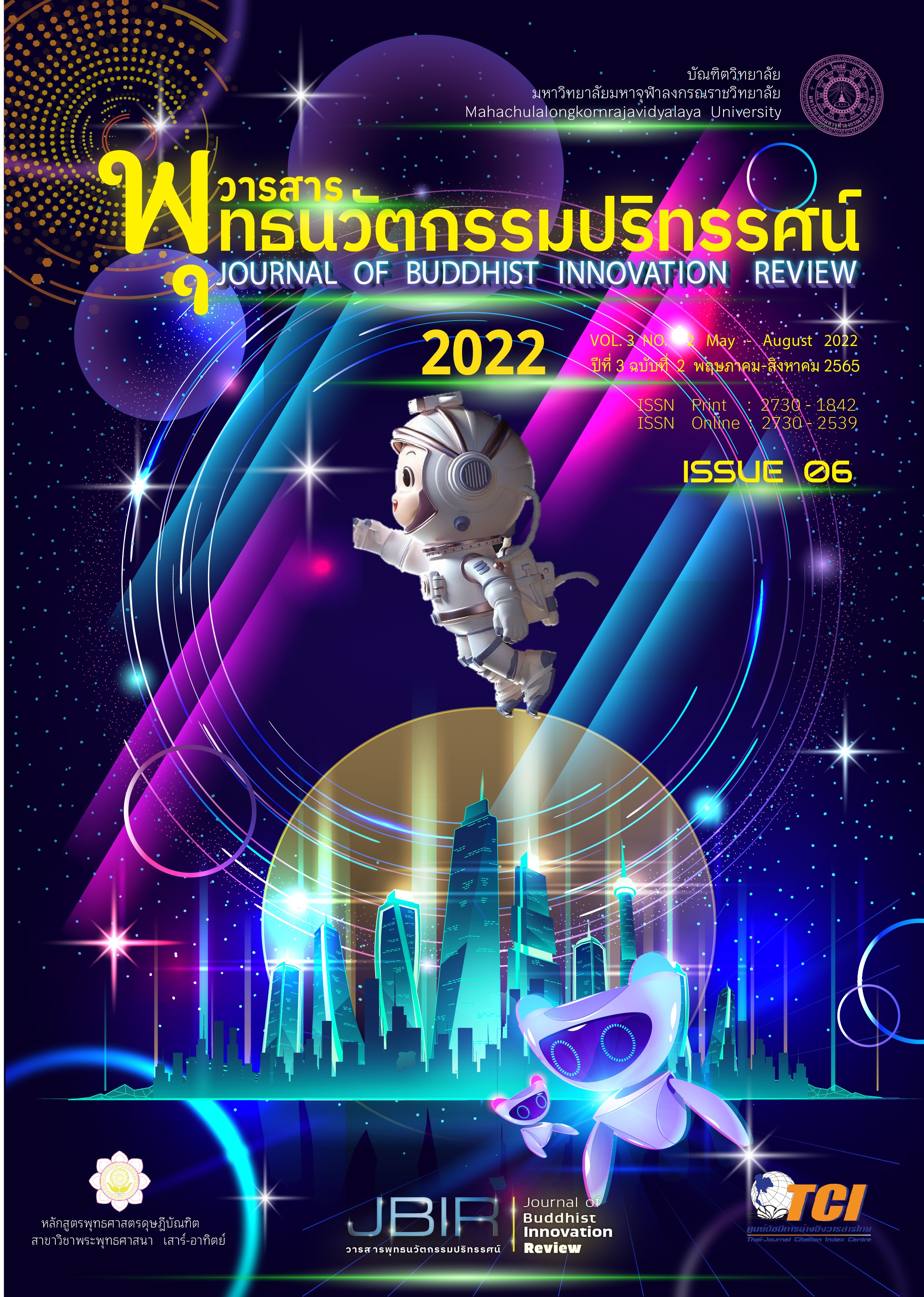Analyze the relationship of gender and Karmma in Buddhism
Main Article Content
Abstract
This article focuses on analyzing relationship of gender and karma in Buddhism. The study found that there are two common rationale factors which are cause to affect being female or being male, including non-female and non-male and bisexual. The first factor is karma, which is an act in which there are 2 types that affect obtaining gender, good deeds or merit and bad deeds or sin. The evil act which has a clear effect on the determination of gender in the next life is the violation of Article 3 precepts, which are harassment, infidelity or adultery with other’s wife or husband or incontinence sexuality. And the second factor is the mental prayer or desire which may be caused by boredom of one's original gender or satisfaction with former gender in the present life. This feeling of being bored or satisfied will cause the mental prayer or desire to get the desired gender in the next life. Therefore, gaining any gender, actions and desires in this life will affect the gaining of gender in the future life. However, at the end gender in Buddhism is not an obstacle to access to the cessation of suffering.
Article Details

This work is licensed under a Creative Commons Attribution-NonCommercial-NoDerivatives 4.0 International License.
เรื่องลิขสิทธิ์/เป็นความคิดเห็นของผู้เขียน
References
เอกสารอ้างิง
หนังสือ
พระพรหมคุณาภรณ์ (ป.อ. ปยุตฺโต), (2546). พจนานุกรมพุทธศาสตร์ ฉบับประมวลธรรม. กรุงเทพมหานคร: โรงพิมพ์มหาจุฬาลงกรณราชวิทยาลัย.
พระพรหมโมลี ( วิลาส ญาณวโร), (2545). มุนีนาถทีปนี. กรุงเทพมหานคร: สำนักพิมพ์ดอกหญ้า.
ธัมมาจริยะ พระสัทธัมมโชติกะ. (2521). ปรมัตถโชติกะ ปริเฉทที่ 1-2-6. กรุงเทพมหานคร: มูลนิธิสัทธัมมโชติกะ.
มหาวิทยาลัยมหาจุฬาลงกรณราชวิทยาลัย, (2539). พระไตรปิฎกภาษาไทย. ฉบับมหาจุฬาลงกรณราชวิทยาลัย. กรุงเทพมหานคร: โรงพิมพ์มหาจุฬาลงกรณราชวิทยาลัย.
มหาวิทยาลัยมหาจุฬาลงกรณราชวิทยาลัย, (2539). อรรถกถาภาษาไทย. ฉบับมหาจุฬาลงกรณราชวิทยาลัย. กรุงเทพมหานคร: โรงพิมพ์มหาจุฬาลงกรณราชวิทยาลัย.
มนตรี สิระโรจนานันท์ (2557). สตรีในพระพุทธศาสนา. กรุงเทพมหานคร: สำนักพิมพ์มหาวิทยาลัยธรรมศาสตร์.
วิทยานิพนธ์
จีรวรรณ ชินะโชติ, (2523). การเปรียบเทียบหลักคำสอนเรื่องกรรมในพุทธศาสนา และศาสนาฮินดู. วิทยานิพนธ์อักษรศาสตรมหาบัณฑิต ภาควิชาปรัชญา. บัณฑิตวิทยาลัย: จุฬาลงกรณ์มหาวิทยาลัย.
เด่นชัย ประทุมแฝง (2561). กระบวนการสร้างอัตลักษณ์เชิงพุทธของกลุ่มความหลากหลายทางเพศในสังคมไทย วิทยานิพนธ์พุทธศาสตรดุษฎีบัณฑิต. วิทยานิพนธ์พุทธศาสตรดุษฎีบัณฑิต กรุงเทพมหานคร: บัณฑิตวิทยาลัย: มหาวิทยาลัยมหาจุฬาลงกรณราชวิทยาลัย.
ปรีชา คุณาวุฒิ, (2521). พุทธปรัชญาเรื่องกรรมและการให้ผลของกรรม. วิทยานิพนธ์อักษรศาสตรมหาบัณฑิต. ภาควิชาปรัชญา. บัณฑิตวิทยาลัย: จุฬาลงกรณ์มหาวิทยาลัย.
วารสาร
จักเรศ อิฐรัตน์, (มกราคม - เมษายน 2550). กรรมที่ทำตามหน้าที่มีวิบากหรือไม่. วารสารพุทธศาสน์ศึกษา จุฬาลงกรณ์มหาวิทยาลัย; 14 (1): 9.
สื่ออิเล็กทรอนิกส์
ธรรมะไทย. (2562). [ออนไลน์]. สหชาติ 7 ของพระพุทธเจ้า. จากhttp://www.dhammathai.org. (สืบค้นเมื่อวันที่ 8 สิงหาคม 2562)
นฤพนธ์ ด้วงวิเศษ. (2562). [ออนไลน์]. ทบทวนวิธีการสร้างความรู้/ความจริงเรื่องเพศ. แหล่งที่มาจาก http://www.sac.or.th. (วันที่สืบค้น 8 สิงหาคม 2562)
สมคิด แสงจันทร์. (2562). [ออนไลน์]. เพศวิถี (ที่รอการ) ศึกษาในพุทธศาสนา: ประกายความคิดเรื่องเพศวิถีในพุทธศาสนากับตัวอย่างพระอรหันต์เพศวิถี.แหล่งที่มาจาก https://www.tcijthai.com. (สืบค้นเมื่อวันที่ 8 สิงหาคม 2562)


